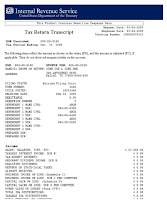
On August 23, 2018 we posted
IRS to Introduce New Tax Transcript as of 9/23/18! where we discussed that
the IRS announced in IR-2018-171 that it is moving to better protect taxpayer data, in a new format for individual tax transcripts that will redact personally identifiable information from the Form 1040 series.
Now, in a Fact Sheet and accompanying Information Release IR-2018-256, IRS has announced it will be making changes to tax transcript procedures. Among the changes are: a) beginning on Jan. 7, 2019, IRS will honor requests to have taxpayer tax transcripts sent to practitioners' secure mailboxes; and b) IRS will stop its tax transcript faxing service as of Feb. 4, 2019.
In
IR-2018-256, the IRS announced that after working with the tax preparation community, the Internal Revenue Service would stop its tax transcript faxing service as of Feb. 4, 2019, and offer a more secure alternative to taxpayers and tax professionals.
The IRS worked with the tax preparation community to reach agreement on an alternative that will meet tax practitioners’ needs in e-filing individual tax returns while also enhancing safeguards for taxpayer data.
The IRS continues to look for ways to better protect taxpayer information and tax transcripts, which are summaries of individuals’ tax returns. Cybercriminals who obtain tax transcripts use them to file fraudulent returns that are difficult to detect because they closely mirror a legitimate tax return.
The halt to faxing transcripts is another step taken by the IRS to protect taxpayer data. In September 2018, the IRS began to mask personally identifiable information for every individual and entity listed on the transcript. See
New Tax Transcript and Customer File Number.
All financial entries on the transcript remain visible. However, tax practitioners who work to bring taxpayers into compliance by filing prior-year tax returns may need access to employer information that taxpayers no longer have. In those cases, tax practitioners may request an unmasked Wage and Income Transcript. The Wage and Income Transcript can be used for current year tax preparation but it generally is not available until mid-year.
Alternatives for taxpayers for return preparation
The IRS has multiple ways taxpayers can obtain a copy of their tax transcript other than faxing. Individuals may still call the IRS to obtain a masked tax account transcript and one will be mailed to the last address of record.
For faster service, taxpayers may go to IRS.gov for Get Transcript Online, verify their identities and create an account. They can then view or download a copy of their tax transcript immediately. Or they can go to IRS.gov for Get Transcript by Mail and request a transcript be mailed to their last address of record. Taxpayers also may call
800-908-9946 for automated service to order a transcript by mail.
Alternatives for tax professionals for return preparation
Starting Jan. 7, 2019, tax professionals who contact the Practitioner Priority Service number may, with proper authorization, have an unmasked Wage and Income Transcript deposited in their e-Services secure mailbox.
Tax practitioners must meet certain requirements in order to use the secure mailbox option. Those requirements are outlined in
Fact Sheet 2018-20, Steps for Tax Professionals to Obtain Wage and Income Transcripts Needed for Tax Preparation. Practitioners also should review
Fact Sheet 2018-21, IRS Offers Tips to Tax Professionals to Reduce CAF Number Errors, Better Protect Data from Cyberthieves.
The Wage and Income Transcript provides information limited to the Forms W-2, 1099 and other income documents sent to the IRS. It does not include general tax transcript information. The Wage and Income Transcript will give tax practitioners the employer information needed to file tax returns electronically.
Tax professionals also may request that an unmasked Wage and Income Transcript be sent to the client’s address of record. Alternatively, taxpayers may request an unmasked transcript for tax preparation, and it will be mailed to their address of record.
Faxing and business tax transcripts
The Feb. 4, 2019, discontinuation of the faxing service also applies to business tax transcripts as well as individual tax transcripts. However, business tax transcripts are not masked. At the request of business taxpayers, the transcript will be mailed to the address of record. Tax professionals may obtain a business tax transcript through the e-Service Transcript Delivery System.
Practitioners who want to access both the SOR and TDS must create an e-Services account and submit an e-File application, if one is not on file. Unenrolled practitioners also must e-file five or more returns annually to access TDS. An e-File application requires a background check and may take up to 45 days to complete so plan accordingly.
Have a Tax Problem?
Contact the Tax Lawyers at
Marini & Associates, P.A.
for a FREE Tax Consultation Contact us at:
or Toll Free at 888-8TaxAid (888 882-9243).

 Under the check the box rules, entities owned by one person can often be disregarded for federal tax purposes. Such entities are referred to as "disregarded entities."
Under the check the box rules, entities owned by one person can often be disregarded for federal tax purposes. Such entities are referred to as "disregarded entities."















